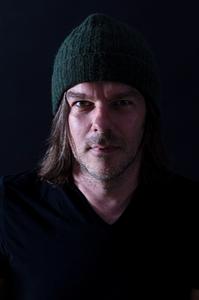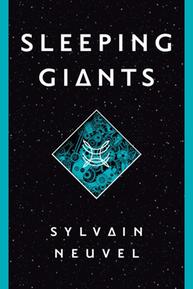
|
|
| photo: James Andrew Rosen | |
Sylvain Neuvel is a translator and a linguist from Quebec who has a Ph.D. in linguistics from the University of Chicago and works as the director of translation services at a Montreal company. He is also a software engineer with a personal passion for robotics and space travel. Sleeping Giants (Del Rey, April 26, 2016) is his first novel.
As a linguist, you're obviously someone who loves working with words and language. Have you always been a writer as well?
I've been writing for as long as I can remember. What form that took has changed a lot over time. I sold comic books to the neighbors to buy candy when I was a kid. I published some poetry when I was 17. Horrible. I worked as a journalist for local newspapers. I co-wrote a screenplay for a TV show, in French. It was optioned, so we made a bit of money, but they never made the show. I didn't always try to make a living out of it. The first full book I wrote was for a girl. It's interesting to write for just one person. I wrote all sorts of things as part of whatever job I had (I've had a lot), published a fair amount of linguistics papers. This is my first novel.
The idea for Sleeping Giants came about because of my son. I wanted to make a toy robot for him--he loves robots--but he wanted to know everything about it before he said yes. He wanted a story to go with it, and I didn't have one. We were watching Goldorak (Japanese anime, it was really big in Quebec) when I started thinking about what would happen if we found some giant alien artifact in real life. I started writing, my son got his toy, and I got a book.
Why write an alien story where the aliens never show their faces?
I wanted Sleeping Giants to feel as real as possible. In movie terms, what I had in mind were things like Close Encounters of the Third Kind, Contact, The Abyss--not Aliens. I loved Aliens, but this had to be about humans, how we deal with that discovery, not them.
To me, there was a Cold War-esque quality to the novel--the threat of mass destruction, the world-destroying weapon. Are you a fan of mid-20th-century science fiction? Did you have any particular guiding influences in crafting this story?
I probably wouldn't go that far back, but there's a lot of the '70s and '80s in this book. Michael Crichton, things like The Andromeda Strain (okay, that's 1969, but I read it later). That vibe you're getting might be some Tom Clancy. I read plenty of his books when I was younger, and it seems to have left a bigger mark than I thought. I see a lot of The Hunt for Red October in it, I noticed while I was writing. The submarine scene was my way of paying homage. There's at least one quote from the movie in there as well for the really hardcore fan. Sleeping Giants is told through a series of interviews, e-mails, journal entries and memos. What led you to this style of storytelling?
Sleeping Giants is told through a series of interviews, e-mails, journal entries and memos. What led you to this style of storytelling?
I love epistolary novels. The format adds realism to the story, and it fit well with what I was trying to do, but there's more to it than that. I read Les Liaisons Dangereuses when I was 11 or 12, and it just blew my mind. Here is a book where just about everyone is lying to everyone, all the time. Even when they want to tell the truth, they're bending it, twisting it out of pride, or shame, or some twisted sense of honor. In some way, the real story--the one you leave with when you finish the book--isn't in the book. You put it together yourself when you figure out the characters, their motivations. Sleeping Giants isn't based on deception, but I wanted to give the readers the satisfaction of figuring some things out on their own. As a reader, I really appreciate when I'm given that opportunity.
What can you tell us about the mysterious voice who acts as an interviewer and a supreme commander throughout much of the book? Do you have a character in mind behind the voice?
I have plenty of things in mind but he would kill me if I shared any of them. He's probably my favorite character. He's the glue that binds the team and the book together. This is a man (it is a man, there's a "he" in there somewhere) with a lot of pressure and a lot of responsibilities. He's very professional. He doesn't let emotion get in the way of things, or so we're meant to believe. He's a very complicated person. Of all the characters in the book, he's the one I really want to have a drink with, many drinks. I love his sense of humor.
There is a lot of fascinating stuff about bodies in this book. The "sleeping giant" of the title is a dismembered humanoid machine. Several characters undergo drastic physical changes as the plot progresses. Was this a conscious preoccupation?
For someone who absolutely loathes metaphors in real life, I do put a lot of them in my writing. This is a search for truth, about the world and about ourselves. It's also a search for things, giant metal body parts. It's a puzzle we're trying to put together. The characters evolve, they undergo some changes, inside and out. I like symmetry, for the internal world to be mirrored in the external world. I think it makes for stronger imagery.
Why write this book in English? Have you ever written or considered writing in French or any other language?
It's refreshing to be asked that question from an Anglophone. I'm really proud of my heritage. I speak French at home. Work is about half and half. This was really about choosing the right tool for the job. Oil versus watercolor, that kind of thing. There are certain things I feel more comfortable writing in French. This felt English to me.
Are there plans to have the book published in French, and if so will you be involved in the translation?
Yes, it will be published in French. We're up to 13 or 14 languages so far (I love that I forget the exact number). I'm also a translator, so pretty much everyone I know asked me why I didn't want to translate it myself. It's time I don't have, so I didn't really give it much thought. More importantly, I enjoy writing, but being done with a book feels really good. Books are big. The idea of writing the same one twice, it's just--no.
Can readers look forward to another installment in the saga?
I hope they do. I'll be done with book two at my end when this one hits the shelves. I don't know when Del Rey will want to release it, but it's definitely coming. I started toying with book three not long ago. There'll be at least three. I'm really excited about where this series is going. --Emma Page, bookseller at Island Books in Mercer Island, Wash.

